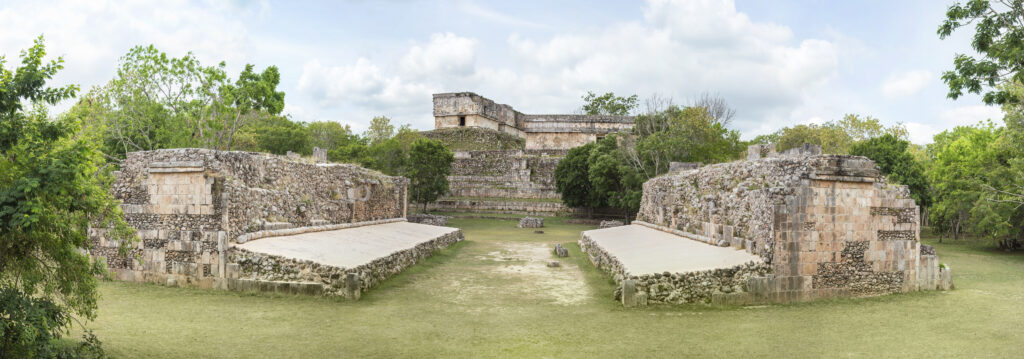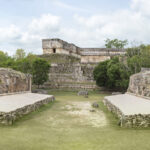Legend of the Twins of the Popol Vuh
The Popol Vuh, or “Book of Council” is one of the few Codices (Books) to have survived the burning of the Maya and other Native American peoples which came with the arrival of the Spanish and the Roman Catholic Church to Central America. It describes the creation myths of the Maya, and also gives an indication of the significance of the Ball Game (Ulama to Mexica (Aztecs) or Pok ta Pok to Maya) in ritual dealing with astrology and the fertility and life cycle of Maize (Corn) which was the Maya staple diet.
In the Popol Vuh, two brothers – Jun Junaipu (1 blowgun) and Wuqub’ Junaipu (7 blowgun) were playing the ball game before entering the Underworld. The Rulers of the Underworld were disturbed by the noise they made, and ordered the brothers to descend into the Underworld in order to test their skills in the ball game against the Rulers of the Underworld. The brothers were deceived, killed and Jun Junaipu’s decapitated head hung from a tree.
A girl by the name of Xkik’ (Woman of Blood) approached the tree, upon which Jun Junaipu’s head spat into the palm of her hand, causing her to become pregnant. Fearing what her father would say, one of the Rulers of the Underworld, she escaped to the Upper world where she sought out the mother of the dead brothers. Here she gave birth to twins: Junaipu (blowgun) and Xb’alanke (Young Jaguar) who found their father’s ball game equipment and started to play. They too were summoned to the Underworld to test themselves against the rulers.
Here in the Underworld the “Hero Twins” as they are usually called in the Codices and the Glyphs on carvings on Stone Temples, underwent all sorts of tests (see below). During one test Junaipu’s head was torn off by a bar. The Rulers of the Underworld thought they were going to win, but Xb’alanke replaced a pumpkin with the brothers head and Junaipu invited the Rulers of the Underworld to play with his head. Xb’alanke tricked the Rulers of the Underworld by having a rabbit jump across the ball court like a ball and while the Rulers of the Underworld were distracted he was able to bring his twin back to life. Both twins, were, however, eventually killed in the tests, and their remains scattered along the river of the Underworld.
After five days the Hero Twins returned and worked a series of great miracles, killing many creatures and bringing them back to life. The Rulers of the Underworld begged the Hero Twins to do the same to them, but after killing them, the Hero Twins did not revive the Rulers of the Underworld. The Hero Twins then ascended into ther heavens where they became the sun and the moon.
This gives an insight into the importance of the Ball Game in Religious Ritual. It was not just an athletic contest, it symbolised the movement of the heavens, with the ball representing the sun. The game was deeply imbued with the symbolism of death and sacrifice, and post-game ceremonies may depict the losing team as being sacrificed. It is also possible, despite the amount of blood depicted in the pictures, that the images of a ball player kneeling before the Rulers with the Rulers holding a knife over his shoulder and at his neck, were “Knighting” the players for having won.
Tests Hero Twins Underwent
One of the many tests the Hero Twins underwent, as in a lot of other Native American cultures, was to rid the world of monsters and anomilies. Junaipu (also pronounced Hunahpu) and Xb’alanke (also spelt Xbalanque) had to get rid of Wuqub Kaquix (7 Macaw), a formidable opponent. As the gigantic, bejewelled, bird descended onto a nantze tree to eat its favourite fruit, Junaipu shot it with his blowgun. In the ensuing struggle the bird-monster ripped off the arm of Junaipu, which was later recovered, but it was doomed as the grandfather (or grandmother) replaced its sharp teeth with soft kernels of maize and the bird died ignominiously. Two more monsters were defeated. One twin defeated the creator of Volcanoes and the other twin defeated the producer of earthquakes.
The twins now moved onto the Lords of Xibalba. Summoned like their father and uncle into the Underworld they were placed in the usual torture chambers which was the destiny of most Maya after death. They tricked the Rulers of the Underworld, even defeating them in the ball game, but were eventually killed. The Rulers of the Upper world, however, did not want them to die, and they were revived, returning to the Court of Xibalba disguised as Dancers and Mountebanks.
They killed the Rulers of the Underworld through clever strathegy, and revived their father, the Maize God, Jun Junaipu, who had earlier been killed also. The Maize God travelled through the Underworld River in a canoe, paddled by two aged deities and naked young women who restored the headgear and jewels which had earlier been taken from him. One picture shows the canoe sinking and the occupants in despair, so the journey may have been fraught with danger, however, the Maize God returned to the surface of the earth through a crack, pictured as the carapace of a turtle.
Royalty-free stock photo ID: 197886914
Mayan Ball court found in Uxmal

![]() L
L
Photo By Leon Rafael
References
[1] Pierre H. Colas & Alexander Voss in Nikolai Grube (Ed.) () Maya: Divine Kings of the Rainforest. pg. 186-191. Konemann, Germany.
[2] Michae D. Coe, Dean Snow & Michael Brion () “Mesoamerican Ball Game” Atlas of Ancient America. pg. 108. Andromeda Books, Oxford, UK.
[3] Michael D. Coe () The Maya: Seventh Edition. Thames & Hudson. London. UK.
ACKNOWLEDGEMENTS
Thanks to Richard Mulcahy & Fiona Connolly-Mulcahy and Kimmage Development Studies Centre @ The Holy Ghost College, Dublin 6W.
ABOUT THIS DOCUMENT
Researched, compiled and written by Enda Mulcahy for the
Eirball | GAA World Archive
Last Updated: 16 November 2021
(c) Copyright Enda Mulcahy and Eirball 2021
You may quote this document in part provided that proper acknowledgement is given to the authors. All Rights Reserved. The Logos and Photos used in this article remain the property of the organisations and individuals which own the copyright and are used here for educational and information purposes only.
